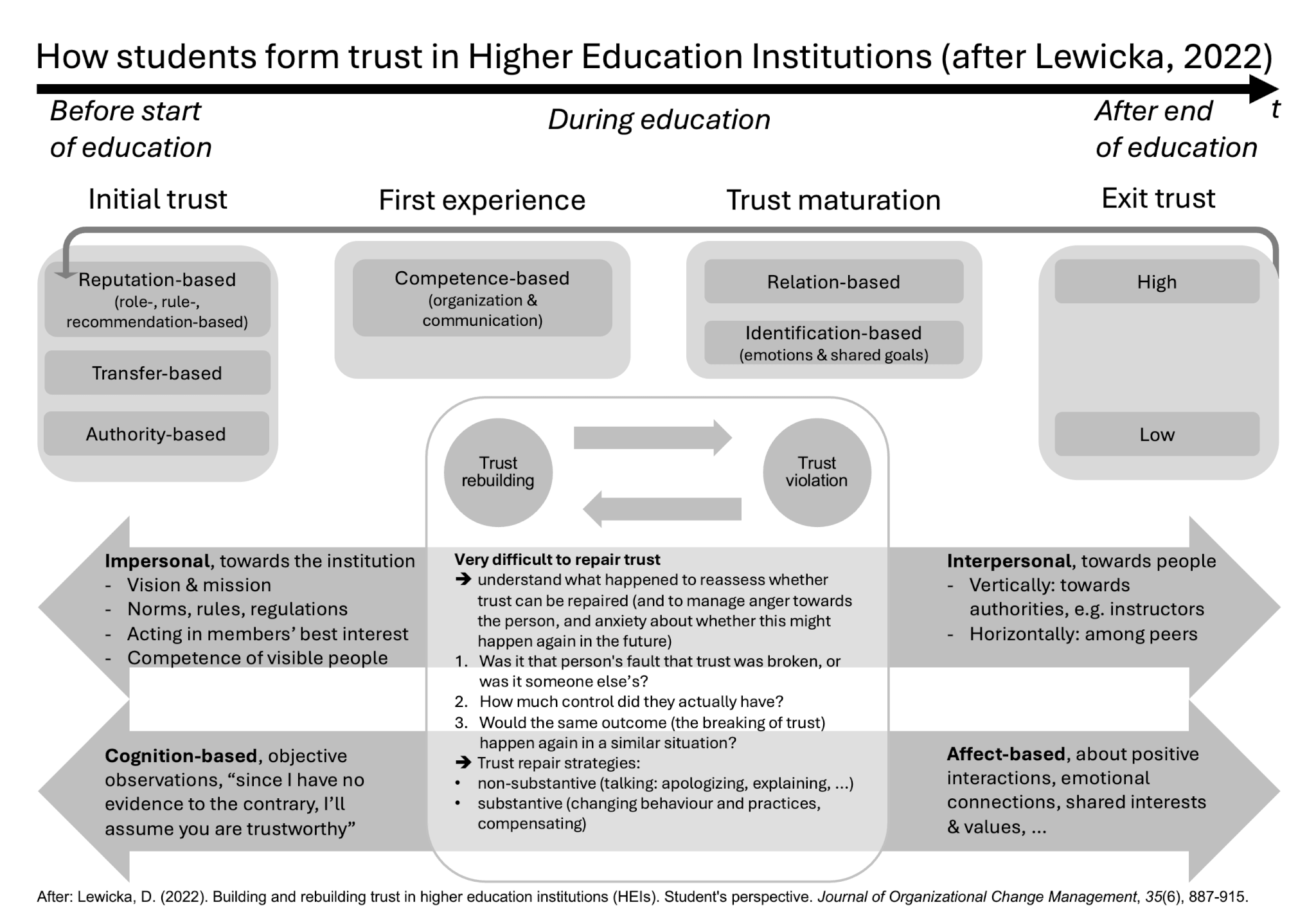
Reading about building and rebuilding trust in higher education (Lewicka, 2022)
Lewicka (2022) investigates how trust in higher education institutions is build (and rebuilt). This is a much broader question than the one that we have investigated, but I recognize many of the elements that we saw in our study, too. I had to redo their figure in order to process it, and here is my summary.
Lewicka (2022) describes trust towards university from before a student enters, while they are there, and then when they leave. Over that time, trust changes and depends on changing factors. Initially, before students start at university, they do not have direct experiences with the university yet, yet there is an initial trust (a calculated one — if they did not think they would get a good education, they would not have chosen to invest time and money into attending that university). The initial trust is based on the university’s reputation (that it is fulfilling its role in providing good higher education, that it is adhering to sensible rules, and maybe that trusted people have recommended it), on transfer of trust from one institution to another by extension, and on authority attributed to universities in general. Since there are no personal connections yet, at this stage trust is mostly impersonal towards the whole institution, and it is based on cognition in a “you have not given me any reason to distrust you yet” sense. Or in our study, several students described that they trust teachers already based on the fact that they are employed by LTH.
As students enter university, they start meeting people and therefore trust now becomes about interaction with people, both in a hierarchy (e.g. with teachers) and among peers. Therefore, also emotions become relevant in addition to the cognitive trust they already had. Students also gain experiences with the competence of the university — both in how well it is organized and how well communication works.
Acceleration of trust-building is based on signals from the teacher similar to what we found, for example asking students questions, showing that the teacher understands the realities of being a student, connecting content to real life applications, kindness and respect, and being authentic in the sense that it is ok to show in a remote learning situation that someone is “chasing the cats off the desk”.
From this, trust matures and becomes mostly about relationships with people, and about emotional identification with the university and what it stands for.
That is, unless trust is broken somewhere along the way. And then it turns out that it is a lot more difficult to repair trust than to build it the first time round. In order to rebuild trust, students need to understand what happened to reassess whether trust can be repaired (and to manage anger towards the person, and anxiety about whether this might happen again in the future). Was it that person’s fault that trust was broken, or was it someone else’s? How much control did they actually have? Would the same outcome (the breaking of trust) happen again in a similar situation? Broken trust should be actively managed, and trust repair strategies put in place, both non-substantive (talking: apologizing, explaining, …) and, more importantly, substantive (changing behaviour and practices, compensating).
And then at some point, students leave — with whatever trust level they have at that stage. But this is not where the story ends, because alumni and their testimonials, both informal and formal, shape the reputation of the university, and thus influence the next generations’ trust.
I think this model is really helpful to have in the back of our mind when we talk about trust, because “trust” is qualitatively different for students in their first weeks vs in their fifth year, and that is important when we think about trust-building teacher moves.
Lewicka, D. (2022). Building and rebuilding trust in higher education institutions (HEIs). Student’s perspective. Journal of Organizational Change Management, 35(6), 887-915.
K. D. says:
Are there differences between trust in university and trust in a department? It seems likely that one can distrust the university, but trust the department(s) one was associated with, but can one trust the university if one does not trust the department?
Mirjam says:
I would assume there are differences, and I would assume one can trust the university in general even though one does not trust a specific department. Surely it depends on what one trusts them (not) to do? I can trust that the university in general provides good education even though my experience with one specific department wasn’t good, or I can trust that I will be treated fairly by central university bodies when calling on them to help because I experienced something in a specific context?